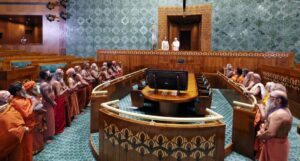Introduction :
Muslim personal law also known as Islamic law refers to the laws that apply to individuals who are identified as Muslims. It is based on the Quran and Prophet Muhammad’s teachings, which together form an extensive body of legal principles and rules concerning different aspects of life like marriage, divorce and succession.
The sources of Muslim Law can be of three types-
- Ancient Sources
- Custom
- Modern Sources
1. Ancient Sources of Muslim Law:

- KORAN (QUARAN): Muslim law is believed to draw most significantly from the Quran which is considered as its main and basic source. It is said that the Quran, as per Muslims’ belief, is God (Allah)’s very word revealed to Prophet Muhammad over a span of 23 years by the Angel Gabriel, in its literal form. The prophecies being in existence since 610 CE and ending at the time of the Prophet’s death in 632 CE. In Islamic faith, it is not Muhammad who authored the Quran but Allah himself. It is regarded as an infallible guidance for Muslim adherents on issues regarding religion, ethics and legislation that cannot be altered in any way.
- THE SUNNA AND AHADIS: The word SUNNA means “a way of action”. These are the traditions and sayings of prophet Muhammad and these were not compiled during his lifetime. The traditions were passed orally and in writing by the companions of prophet Muhammad. Sunna is a collection of traditions regarding prophet Muhammad’s practices and acquiescence and Ahadis are the sayings and doing reported verbally.
- THE IJMA: The third source of Muslim Law both from the point of time and importance is IJMA. This is what all Islamic jurists regard as correct as far as cases of law are concerned. Scholars of a given period use it as mutual consent on a certain issue which is not clearly stipulated in Quran or hadith.
- THE KIYAS (QIYAS): Thus, if there is a legal question which has not been resolved by the Quran, Sunna, or consensus, Qiyas lets jurists extrapolate. They deduce the legal decisions by comparing the legal judgments with the fresh circumstances.
2. CUSTOM:
In Muslim law, custom refers to traditional practices and norms that have been consistently followed by the Muslim community in a particular locality or region. People also often adhere to traditional practices in task performance and may affect judge’s decisions to some extent in areas not regulated by the Quran, Sunnah, Ijma, or Qiyas.
There are some conditions must be fulfilled for a valid custom. These are-
1. General prevalence in the country is necessary.
2. The practice of a limited number of individuals cannot be recognized as a custom.
3. It must be territorial.
4. It need not be existing from the time of the prophet’s companions.
5. It must be ancient and invariable.
6. It should not been opposed to public policy.
3. MODERN SOURCES:

In modern time there are several additional sources of Muslim Law, which are considered as modern sources.
1. Equity, Justice, and Good Conscience: This principle empowers the judges to find a legal loophole that can fit into a given case to suit it, this is called Istihsan or juristic preference.
2. Precedent: These decisions provide legal precedents that mean lower courts have to follow them, when the higher courts hear other cases.
3. Legislation: Various acts that are present in Indian Parliament as well as in different state parliaments include matters affecting the Muslims like the Guardians and Wards Act and the Muslim Wakf Act.
These sources play a role in determining the legal policies and legal systems of today’s Muslim nations.
CONCLUSION:
Therefore, based on the traditional principles found in the Quran, Sunnah, Ijma and Qiyas, Muslim law has emerged. Also, the contemporar interpretations may include equity, justice good conscience, judicial statutes and regulatory enactments. All these sources in unison serve as primary references for the managing and ruling of Muslim communities and their legal systems, always with a view towards the modern world while not losing sight of the Islamic Law or the society’s standards.


